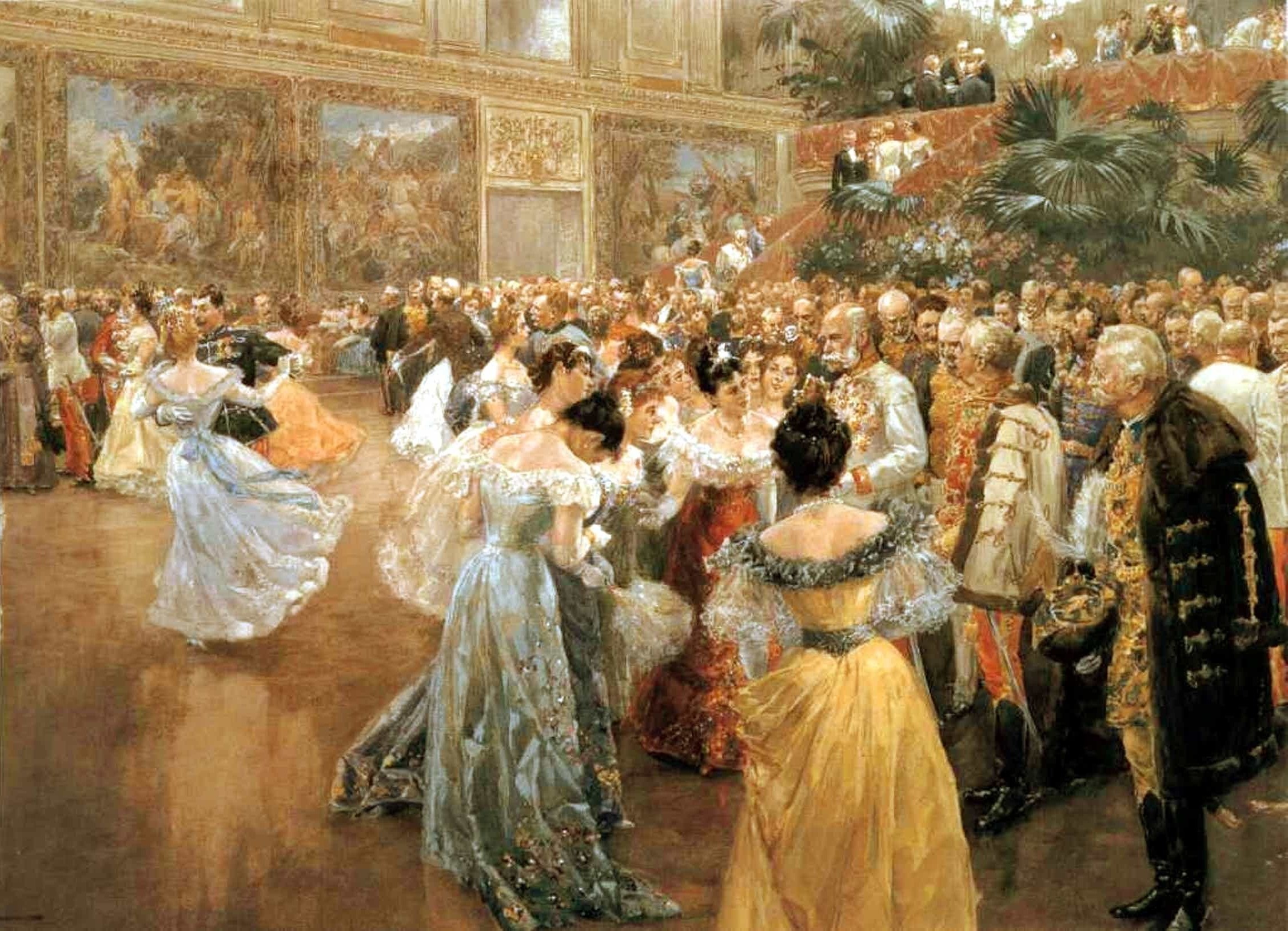George Clare Showed How We Waltz Into Genocide

By Harry Clynch
Staff Writer
29/7/2022

Emperor Franz Joseph I of Austria at a Ball in Vienna in 1900, to celebrate the beginning of a new century, by Wilhelm Gause
I first came across the writing of George Clare by chance. I was browsing the books in an Oxford charity shop when I happened to pick up his second memoir, Berlin Days. I’d never heard of him – and not many people have.
Clare was born Georg Klaar, the only son of middle-class Jewish parents in Vienna. After the Anschluss of 1938, when it became too dangerous for Jews to remain in Austria, they fled. Clare ended up in Britain, while his parents went to Paris, where his father had been offered a job in a bank before the German Occupation. After the Nazi invasion, they were deported to eastern Europe and, ultimately, murdered at Auschwitz. Clare permanently settled in Britain, and served in the Intelligence Corps’ Denazification Bureau in post-war Berlin.
His first book, Last Waltz in Vienna, won the 1982 WH Smith Literary Award, but Clare never came close to the dizzying heights reached by contemporaries like George Orwell, Ernest Hemingway, or Evelyn Waugh. Working under the famous German publisher Axel Springer, Clare had a solid but relatively undistinguished journalism career in London. He retired to Newmarket, a quiet rural town near Cambridge, and died in 2009. But his two memoirs are some of the finest pieces of writing to emerge from the Second World War.
Last Waltz in Vienna is a touching account of his family’s comfortable life in pre-war Vienna, a city which he loves deeply – but which turns against him. It’s an elegy to “that whole world which has disappeared forever.” Throughout the book, Clare lyrically recalls his peaceful, happy, childhood days dancing and romancing in the city he loves – a bittersweet portrait of a youthful innocence that’s destined to be shattered.
Clare’s literary skill comes from the way he weaves these memories and reflections into something approaching a historical theory. The book is partly a memoir, partly a family history, and partly an analysis of how previously unimaginable horrors end up happening. Clare’s innocent naivety in the years leading up to the Holocaust – in many ways shared by his parents, fellow Jews, and wider society – helps to explain how such atrocities were allowed to happen. We end up at the gates of Auschwitz because nobody believed such evil was actually possible.

Jewish women and children from Hungary walking toward the gas chamber in the Auschwitz concentration camp, May/June 1944
Particularly towards the start of the book, we’re given plenty of anecdotes which, with the benefit of hindsight, forebode the tragedy that’s to come. The first confrontation, in 1936, when he’s 15, is one of the most jarring. During a sports lesson at school, supervised by a teacher who looked like “the perfect Nazi,” the rest of the boys start singing anti-Semitic songs. Even at this relatively late stage, only two years before the Anschluss, he feels confident enough to complain to the headteacher. He does – and is expelled the next day.
But what’s more troubling is that the warning signs aren’t taken. The incident isn’t even reflected on at any length. That’s not neglect on Clare’s part, but an acknowledgement that it simply wasn’t viewed with any real gravity at the time. He and his family are dismissive, almost glib, about the anti-Semitic flood rising around them. Clare reads Mein Kampf, but cannot take it seriously. With his father, he listens to the first broadcast of a Hitler speech on Austrian radio, but isn’t really bothered. “We both noted that he had made few remarks about the Jews,” he writes. “A few routine curses, yes, but no more.” They innocently believe that moderate nationalists, those “gentlemen with academic degrees, pan-German souls, but […] with good, honest, red-white-red Austrian hearts,” would keep the Nazis in check. Their life continues largely as normal.
Clare’s family doesn’t leave Vienna until late in the day because they do not – and cannot – believe that their love for Austria is no longer reciprocated. As he describes in Berlin Days, Clare’s father worships not at the synagogue, “but almost daily at the altar of German literature.” Even when he’s about to leave Vienna for good, Clare can’t help but feel patriotic admiration for the Austrian soldiers who had become his oppressors. “So conditioned was I, the 17-year-old Jew, by my Austro-German upbringing, so deeply engrained was all that I had read, that I could not see these clean-limbed young men as my enemies,” he recounts. “The Nazis, the SS, the SA, they were my enemies, but not the young and handsome soldiers of the Wehrmacht.” The betrayal somehow makes it all seem even more horrific.
The journey to Auschwitz is slow but disturbingly easy. The lyricism of the writing, and the blissful ignorance which is depicted for much of the book, means events move along seamlessly until, suddenly, all is lost. Last Waltz in Vienna shows how terrible tragedies can happen because nobody realizes, or nobody can bring themselves to realize, what’s going on. Like all great writers, Clare examines his subjects – himself and his own family – with honesty but also generosity, and never tries to make matters black-and-white. Nor does he absolve himself of responsibility. “The world and its leaders knew very early on what happening,” he writes in the memoir’s conclusion. “And the world, we, all of us, let it happen. We did nothing.”
Last Waltz in Vienna shows how terrible tragedies can happen because nobody realizes, or nobody can bring themselves to realize, what’s going on.
While Berlin Days is a very different kind of book, much less lyrical and more focused on the politics of post-war Germany, the author’s personal qualities – of intelligence, compassion, and balance – shine through. Serving in the British Army’s Intelligence Corps, he deliberately engineers a posting to Germany in 1946, mainly because he wants to try and make sense of his family’s suffering at the hands of the Nazis.
Despite what had happened to his family only a few years earlier, Clare goes to Germany with no hate or desire for revenge. While of course on one level incredibly personal, his mission is ultimately an intellectual one: he wants to discover how and why “the country of the ‘Ditcher und Denker’, the poets and thinkers, had turned into the land of the ‘Richter und Henker’, the blood-judges and hangmen, which had murdered [his] parents.”
It would be easy to conclude that the Germans were simply savages – and it would be especially easy for Clare to do so. But he’s too intelligent, too open-minded for that. Remarkably, he approaches the subject with a high level of dispassion, despite the terrible fate of his family. Clare accepts why, in certain conditions, the apparent order and stability Nazism offered could be enticing. He refuses to judge those who flirted with Nazism, acknowledging generously that “the apparent power of a dictatorship to get things done fascinates many – especially the impatient young.”
As is common with the sharpest thinkers, this is influenced by his strong capacities for self-criticism and intellectual honesty. While working on denazification, Clare is confronted by a German civilian who, feeling judged for her inaction, asks what possibly she could’ve done to stop Hitler’s persecution of the Jews. Clare gives an answer which he knows is fluffy and unconvincing, before remembering his own inaction in pre-war Berlin, when he did nothing to protest the sight of Polish Jews being escorted to prison and, ultimately, their certain death. “What did I do? I looked away, thanking God I was an Austrian and not a Polish Jew.”
As a result, Clare rejects the “holier than thou” attitude adopted by some. He recognizes that most of us would do little or nothing in the same terrible circumstances. But that’s not to say he’s soppy, naïve, or too forgiving. Clare demonstrates a very low tolerance for bullshit, and almost instinctively identifies the genuine Nazis who must be punished for their crimes.
Clare rejects the “holier than thou” attitude adopted by some. He recognizes that most of us would do little or nothing in the same terrible circumstances.
In an understated way, Clare’s writing is full of compassion. He often sees in the eyes of defeated Germans a vision of his own people’s suffering, something that leads him to a delicate moral position. He doesn’t completely absolve the German people of responsibility, but argues they were “tramped and stamped,” by circumstance and tradition, in such a way that made them “protagonists as well as victims of a uniquely German manifestation of patriotism.” It’s a fair, nuanced stance for a man who had every incentive to conclude differently.
A beautiful writer who had the qualities of compassion, fair-mindedness, and intellectual honesty in abundance, Clare had everything needed to become a literary icon. So why was he never recognized as such? Luck can play an outsized role in catapulting people into literary fame; perhaps he just never got lucky. Perhaps his two books simply got lost in the deluge of war-writing that emerged in the years after 1945. Who knows? But what’s for sure is that George Clare is one of the most underrated writers of his generation: a true great that, for whatever reason, slipped through the net.
